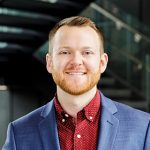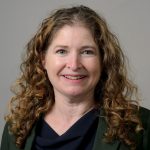 After scrambling to find three credits to fill his first semester schedule, David Schless convinced a professor to allow him to enroll in an upper-level sociology of aging class and was ultimately introduced to an undergraduate program he would have never otherwise contemplated. At a certain point, he was introduced to Dr. Nancy Sheehan, who agreed to become his undergraduate advisor and ultimately played a significant role helping him create a unique, robust undergraduate program that was heavy on gerontology and policy with exposure to many of the outstanding HDFR faculty at UConn in the mid-1980s. It was in a policy-oriented class with Dr. Steven Wisensale his junior year that he met Susan Martino, who he subsequently dated (post-UConn) and married in 1991. With much encouragement from Dr. Sheehan and adjunct professor Dr. Rikke Wassenberg, David become the first HDFR student to go through the relatively new UConn Honors program.
After scrambling to find three credits to fill his first semester schedule, David Schless convinced a professor to allow him to enroll in an upper-level sociology of aging class and was ultimately introduced to an undergraduate program he would have never otherwise contemplated. At a certain point, he was introduced to Dr. Nancy Sheehan, who agreed to become his undergraduate advisor and ultimately played a significant role helping him create a unique, robust undergraduate program that was heavy on gerontology and policy with exposure to many of the outstanding HDFR faculty at UConn in the mid-1980s. It was in a policy-oriented class with Dr. Steven Wisensale his junior year that he met Susan Martino, who he subsequently dated (post-UConn) and married in 1991. With much encouragement from Dr. Sheehan and adjunct professor Dr. Rikke Wassenberg, David become the first HDFR student to go through the relatively new UConn Honors program.
After graduating from UConn, David attended the University of North Texas, which at the time had the nation’s premier graduate program for professionals working in long-term care. The program, created by the Administration on Aging in 1968, had a significant business focus (accounting, finance, management) and both a thesis and an extensive internship requirement for graduation. With his older brother working in the Pentagon for the Department of Defense, David accepted a research-oriented internship in nearby Annapolis, MD with the National Association for Senior Living Industries (NASLI), a 501c3 trade association comprised of executives from a wide variety of businesses serving older adults. After receiving his MS from North Texas in 1989, David accepted a research position with NASLI, where he met several professionals involved in the fledgling seniors housing business.
In 1991, when David was 25, the Washington, DC-based National Multifamily Housing Council (NMHC) offered him an opportunity to launch a Seniors Housing Committee, which in 1995 became the American Seniors Housing Association (ASHA). ASHA was a 501c6 which lobbied on Capitol Hill on behalf of owners and operators of seniors housing (including both for-profit and not-for-profit entities involved in independent living, assisted living, memory care, and life plan/continuing care retirement communities). The Association also began conducting a variety of research studies to better understand the needs and desires of older adults and their families, and to better understand the underlying business and investment case for senior living. In 2001, ASHA spun-off from NMHC and has continued to represent owners and operators, conduct and/or sponsor a multitude of research projects, and help older adults and their families navigate the complexities of senior living on the Association’s www.WhereYouLiveMatters.org website. David has served as the American Seniors Housing Association’s president & CEO since its inception 33 years ago.
David and Susan have lived in Rockville, MD since the early 1990s where they raised two grown children and numerous cats. David has been actively involved with the Alzheimer’s Association for much of his professional career and has helped raise more than $60 million to fund research for a cure. He has also served on the Advisory Board of the Cornell Institute for Healthy Futures and the Granger Cobb Institute for Senior Living at Washington State University.
 Dr. Ryan Watson studies the health and well-being of sexual and gender diverse (SGD) youth and young adults. Coming from a family with no college graduates, he began his research career when he spotted a flyer that advertised a research opportunity. The flyer hung outside his classroom at UCLA, mostly covered over by spring break and fraternity advertisements. He figured research was important if he wanted to go to graduate school someday, and he might first pursue a chance to get involved in research before signing up to party for spring break.
Dr. Ryan Watson studies the health and well-being of sexual and gender diverse (SGD) youth and young adults. Coming from a family with no college graduates, he began his research career when he spotted a flyer that advertised a research opportunity. The flyer hung outside his classroom at UCLA, mostly covered over by spring break and fraternity advertisements. He figured research was important if he wanted to go to graduate school someday, and he might first pursue a chance to get involved in research before signing up to party for spring break. Congratulations to Tracy Walters (PhD ’23) who recently accepted a new position as Teaching Assistant Professor and Director of the Applied Psychology Data Analytics Master’s program at Marquette University to start this Fall!
Congratulations to Tracy Walters (PhD ’23) who recently accepted a new position as Teaching Assistant Professor and Director of the Applied Psychology Data Analytics Master’s program at Marquette University to start this Fall!
 Cali Salafia is a Ph.D. candidate in HDFS who plans to defend her dissertation and graduate in Spring 2025. She earned her bachelor’s degree in psychology with a minor in philosophy from the University at Albany (SUNY) in 2017 and obtained a master’s degree in health psychology from Central Connecticut State University in 2020.
Cali Salafia is a Ph.D. candidate in HDFS who plans to defend her dissertation and graduate in Spring 2025. She earned her bachelor’s degree in psychology with a minor in philosophy from the University at Albany (SUNY) in 2017 and obtained a master’s degree in health psychology from Central Connecticut State University in 2020.
 Assistant Professor Na Zhang recently organized a mindfulness workshop at UConn Stamford. She led students in meditation and discussed how to work with stress and improve quality of attention. Na plans to have one or two more of these workshops this semester.
Assistant Professor Na Zhang recently organized a mindfulness workshop at UConn Stamford. She led students in meditation and discussed how to work with stress and improve quality of attention. Na plans to have one or two more of these workshops this semester.